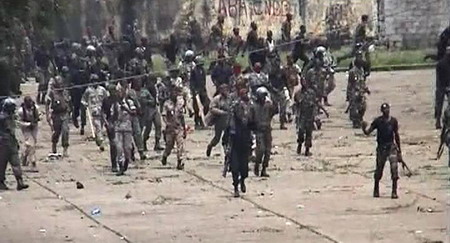Guinean junta leader regrets bloodshed after 150 dead
|
 Security forces move towards protesters in Conakry in this frame grab taken from September 28, 2009 footage. [Agencies]
|
ABIDJAN: Guinea's military junta leader has expressed regret over the bloodshed in the clash between the opposition and security forces in the capital Conakry, Radio Senegal reported on Tuesday.
More than 150 people were killed and over 1,000 others injured in the confrontation on Monday, when soldiers loyal to Capt. Moussa Dadis Camara opened fire at protestors against his candidacy for the presidential elections set for January.
Camara told the radio that September 28 was "a dramatic day" for Guineans and expressed his "regret and indignation" for what had happened in Guinea.
The clash is the worst since the military junta seized power in a coup hours after the death of president Lansana Conte in December.
The situation is volatile in tensions not only in Guinea, but between the military junta and the outside world.
After the riot, UN Secretary-General Ban Ki-moon urged "Guinean national authorities and the security forces to exercise maximum restraint and to uphold to the rule of law, including respect for basic human rights."
The latest report from Paris said France decided to suspend its military cooperation with the authorities in Guinea.
The opposition forces in Guinea comprising trade unions, political parties, civil society and non-governmental organizations already threatened to boycott the junta's involvement in the election before the latest incident, which scuttled the fragile consensus for a presidential vote to end the crisis.
The standoff between the opposition and the military junta went ugly after Camara, who until May confirmed no part in the future presidential election, announced his candidacy in August to spark an outcry from the opposition, especially the United Forces for the Democratization of Guinea.
The junta leader insisted that nothing could bar him from aspiring to the top seat in Guinea as long as the people still want him.
The opposition threatened to "bring out everybody to the streets" in protest against him.
On August 27, riots broke up in Conakry between security forces and young protestors against Camara's plan to run in the election. The clashes led to injuries and several arrests.
Camara and his ruling National Council of Ministers of Democracy and Development (CNDD) were not supposed to run in the upcoming elections negotiated with the International Group of Contact on Guinea.





















